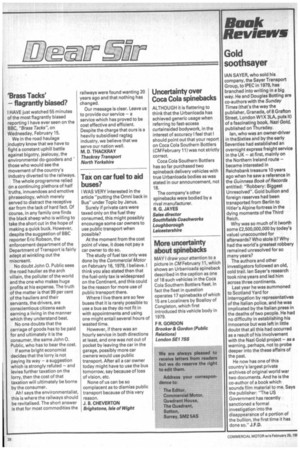kami r OM =
Page 30

If you've noticed an error in this article please click here to report it so we can fix it.
'Brass Tacks' — flagrantly biased?
I HAVE just watched 55 minutes of the most flagrantly biased reporting I have ever seen on the BBC, "Brass Tacks", on Wednesday, February 15.
We in the road haulage ,industry know that we have to fight a constant uphill battle against bigotry, jealousy, the environmental do-gooders and those who would see the movement of the country's industry diverted to the railways.
The whole programme relied on a continuing plethora of half truths, innuendoes and emotive phraseology, which merely served to distract the receptive ear from the lack of hard fact. Of course, in any family one finds the black sheep who is willing to take the short cut in the hope of making a quick buck. However, despite the suggestion of BBC reporter Eric Robson, the enforcement department of the Department of Transport is fairly adept at winkling out the miscreant.
No doubt John a Public sees the road haulier as the arch villain, the polluter of the world and the one who makes huge profits at his expense. The truth of the matter is that 99 per cent of the hauliers and their servants, the drivers, are conscientious citizens each earning a living in the manner which they understand best.
No one doubts that the carriage of goods has to be paid for and ultimately it is the consumer, the same John 0. Public, who has to bear the cost.
If some bright economist decides that the lorry is not paying its way — a suggestion which is strongly refuted — and levies further taxation on the lorry, then the cost of that taxation will ultimately be borne by the consumer.
Ah! says the environmentalist, this is where the railways should be revitalised. The short answer is that for most commodities the railways were found wanting 20 years ago and that nothing has changed.
Our message is clear. Leave us to provide our service — a service which has proved to be cost effective and efficient. Despite the charge that ours is a heavily subsidised ragtag industry, we believe that we serve our nation well.
M. D. THACKRAY Thackray Transport North Yorkshire
Tax on car fuel to aid buses?
I WAS VERY interested in the article "putting the Omni back in Bus" under Topic by Janus.
Surely if private cars were taxed only on the fuel they consumed, this might possibly encourage some car owners to use public transport when possible?
At the moment from the cost point of view, it does not pay a car owner to do so.
The study of fuel tax only was done by the Commercial Motor on February 16, 1979,1 believe. I think you also stated then that the fuel-only tax is widespread on the Continent, and this could be the reason for more use of public transport there.
Where I live there are so few buses that it is rarely possible to use a bus as they do not fit in with appointments and using one might entail several hours of wasted time.
However, if there was an hourly service in both directions at least, and one was not out of pocket by leaving the car in the garage, possibly more car owners would use public transport. After all a car owner today might have to use the bus tomorrow, say because of loss of vision, etc.
None of us can be so complacent as to dismiss public transport because of this very reason.
J. B. CHEVERTON Brighstone, Isle of Wight
































































































